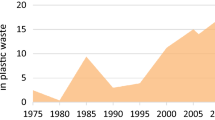Abstract
This article discusses the poorly assessed topic of informal waste management systems, in which there appears to be a high level of heterogeneity throughout the world. The article considers the ways scavengers function within the broader context of waste management; they show a wide range of locally formed and adapted activities and social systems. Examples from different cultures are included: the United States, Jamaica, Brazil, Egypt and Indonesia. The authors advocate comparative research and find a contextual, holistic approach to be the most appropriate. Using such an approach, they isolate the important factors that characterize these systems: technical, socio-cultural, socio-political and organizational aspects are elaborated. Experiments in intervention have been undertaken at various levels, from varying ideological and theoretical backgrounds. Academic analyses have ranged from neo-Marxist political economy models to neo-liberal development approaches. As expressed in the title the authors conclude that informal waste management systems are unjustifiably considered problematic whereas they often reveal great development potential.
Similar content being viewed by others
References
Adeyemi, A.S., Olorunfemi, J.F. and Adewoye, T.O.: 2001, 'Waste scavenging in third world cities: a case study in Ilorin, Nigeria', Environmentalist 21(2), 93–96.
ASMARE Street Scavenger's Association: 1998, Street Scavengers:Partners of the Selective Waste Collection of Belo Horizonte, Belo Horizonte, Brazil (pamphlet).
Baud, I., Grafakos, S., Hordijk, M. and Post, J.: 2001, 'Quality of life and alliances in solid waste management: contributions to urban sustainable development', Cities 18(1), 3–12.
Birkbeck, C.: 1978, 'Self-employed proletarians in an informal factory: the case of Cali's garbage dump', World Development 6(9/10), 1173–1185.
Birkbeck, C.: 1979, 'Garbage, industry, and the 'vultures' of Cali, Colombia', in R. Bromley and C. Gerry (eds.), Casual Work and Poverty in Third World Cities, New York, John Wiley and Sons, pp. 161–183.
DiGregorio, M.: 1994, Urban Harvest: Recycling as a Peasant Industry in Northern Vietnam, East West Center Occasional Paper no. 17, Honolulu, East West Center.
Figueroa, M.: 1998, 'The community as a resource for solid waste management', in E. Thomas-Hope (ed.), Solid Waste Management: Critical Issues for Developing Countries, Kingston, Canoe Press, pp. 27–46.
Fonseca, I.: 1996, Bury Me Standing: The Gypsies and their Journey, New York, Vintage.
Gage, I.: 1998, 'The effect of the method of household containment on solid waste management', in E. Thomas-Hope (ed.), Solid Waste Management: Critical Issues for Developing Countries, Kingston, Canoe Press, pp. 159–167.
Jaffe, R.: 2001, Nice Up Your City, Nice Up Your Self: Solid Waste Management in Kingston, Jamaica, Leiden University Master's Thesis.
Medina, M.: 1997, Informal Recycling and Collection of Solid Wastes in Developing Countries: Issues and Opportunities, UNU/IAS Working Paper No. 24, Tokyo, United Nations University/Institute of Advanced Studies, July 1997.
Medina, M.: 2000, Scavenger Cooperatives in Asia and Latin America, Downloaded from http://www.gdnet.org/pdf/medina.pdf, January 15, 2003.
Ojeda-Benitez, S., Armijo-de-Vega, C. and Ramírez-Barreto, M.E.: 2002, 'Formal and informal recovery of recyclables in Mexicali, Mexico: handling alternatives', Resources, Conservation and Recycling 34, 273–288.
Perry, S.E.: 1978, San Francisco Scavengers: Dirty Work and the Pride of Ownership, Berkeley/Los Angeles/London, University of California Press.
Sigular, D.T.: 1992, Scavengers, Recyclers, and Solutions for Solid Waste Management in Indonesia, Center for Southeast Asia Studies Monograph No. 32, Berkeley, University of California.
Svadlenak-Gomez, K.: 1999, From Scavengers to Eco-Aides: The Environmental and Social Opportunities of Working with Informal Sector Recyclers, New York, CUNY Master's Thesis.
Thomas, C.: 1999, 'Waste management and recycling in Romania: a case study of technology transfer in transition', Technovation 19, 365–371.
a.asp., May 11, 2001
UNESCO: 2001, http://www.unesco.org/most/southam4.htm, May 11, 2001.
Versnel, H.: 1986, 'Scavenging in Indonesian cities', in P.J.M. Nas (ed.), The Indonesian City,Verhandelingen van het Koninklijk Instituut voor Taal-, Land-en Volkenkunde 117, Dordrecht, Cinnaminson, Foris Publications, pp. 206–219.
Author information
Authors and Affiliations
Corresponding author
Rights and permissions
About this article
Cite this article
Nas, P.J., Jaffe, R. Informal Waste Management. Environment, Development and Sustainability 6, 337–353 (2004). https://doi.org/10.1023/B:ENVI.0000029912.41481.a5
Issue Date:
DOI: https://doi.org/10.1023/B:ENVI.0000029912.41481.a5




